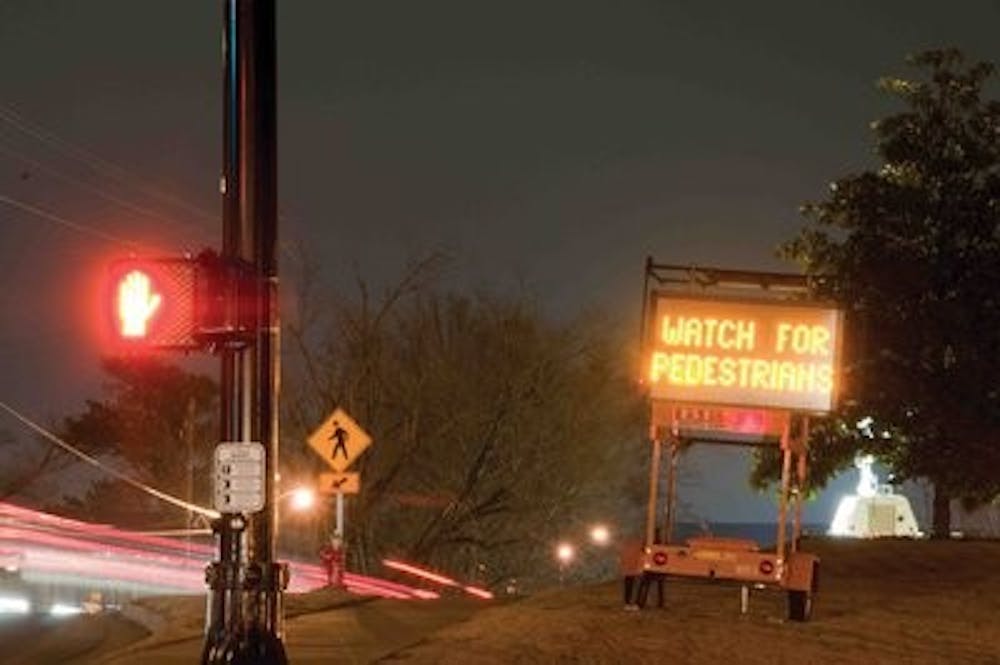Five generator-powered lights and a red-lettered sign warning drivers to watch for pedestrians have been installed on Magnolia Avenue as part of collaboration between the city and University to make that area safer for pedestrians.
However, these are only a few of the projects planned for the city.
The city and the University meet approximately once a month to discuss issues of mutual interest and how they will handle them, said Catherine Love, civil engineer in the University's facilities division.
"The whole thrust of our meetings is to share as much information as possible and then to make sure that we're working together to make sure (there are no misunderstandings)," said City Manager Charlie Duggan.
During these meetings they also discuss how projects will be financed and completed. Sometimes the University picks up the tab or provides staff to complete them, other times the city does.
One example of the University paying for a project will be the installation of permanent lights along Magnolia Avenue.
These projects come on the coattails of approximately a dozen pedestrians being hit by vehicles in 14 months.
"Accident statistics play a large role in deciding which roadway projects get done," Love said. "Be it lighting or be it drainage, be it pavement markers or signage."
President Jay Gogue said, statistically, Auburn is one of the safest college campuses nationwide.
"But I always point out, when you have an accident, you have an injury, you have a problem, the statistics don't mean anything," Gogue said.
During the summer the generator-powered lights will be replaced by permanent light fixtures. Approximately 20 30-foot-tall poles will be installed along the south side of Magnolia Avenue by June, according to documentation provided by the city.
The lights will only be installed on the University's side of the road because city officials anticipate that the lights will light the entire street, Duggan said.
The University will pay for the light fixtures and the installment, and then the city will take over maintenance costs and paying for the power bill, Love said.
Another major project involves installing two to four signs in the seven crosswalks on Magnolia Avenue.
The signs should be delivered in a few weeks, said Public Works Director Jeff Ramsey.
The yellow and white signs will be several feet tall and warn drivers to stop when there is a pedestrian in the crosswalk.
Duggan said the difficulty with this project is planning where to place the signs. The signs will be in the middle of the road so the city has to make sure they will not interfere with the flow of traffic.
In addition to these projects, the city has already planned a week-long program called, "Travel With Care," that will focus on heightening awareness about pedestrian safety. The program will be April 5 through 9.
During the program the city will focus on three things: education, enforcement and engineering.
The education component will consist of city employees handing out fliers reminding residents how to travel more safely. They will also be giving warning citations to jaywalkers.
"We're going to have people out handing out warning citations to people who are jaywalking saying, 'You know, you could get a ticket for this, plus you could get run over,'" Duggan said.
The third component of the program enforcement will include a greater number of bicycle police officers around Magnolia Avenue. However, Duggan said they do not intend to fine for jaywalking.
The city does not plan to permanently increase police presence along Magnolia Avenue, either, said Public Safety Director Bill James.
"We find when we sit there, everybody's obeying the law," James said. "But we can't have somebody sit down there 24/7."
The city will focus on engineering by carrying out projects such as installing signs and lighting on Magnolia Avenue in the future.
However, some are concerned the city might be dragging its feet about implementing structures that will increase safety.
"I said, 'When are we going to get lights, when are we going to get speed bumps?'" said Sue Ann Balch, assistant director of the Office of International Education. "And (I got) excuse after excuse."
However, Balch said she would not tar the University with the same brush of hesitancy as the city.
"I think the University is doing absolutely everything they possibly can," Balch said.
The Office of International Education hosts a seminar each spring and fall to acclimate foreign students to customs in the U.S. Balch said it plans to extend the potion of its seminar on traffic laws.
Balch admitted she is passionate about pedestrian safety because her daughter was almost killed while crossing the street Sept. 2, 2005.
Her daughter and a date were crossing the street on Glenn near the Auburn downtown area because they thought a car had stopped to let them pass. Balch said the driver had actually bent down to retrieve a dropped cell phone and ended up hitting her daughter.
"She had six surgeries in 10 days," Balch said. "She could have died."
Do you like this story? The Plainsman doesn't accept money from tuition or student fees, and we don't charge a subscription fee. But you can donate to support The Plainsman.





